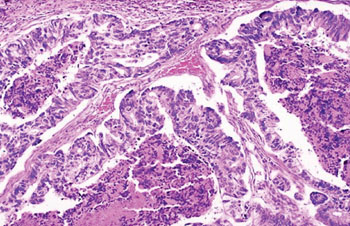Promising Blood Biomarkers Isolated for Colorectal Cancer
By LabMedica International staff writers
Posted on 13 Nov 2014
The search for blood-borne biomarkers that could be used to screen for colorectal cancer (CRC) has uncovered two promising candidates that may one day lead to the development of a simple blood test.Posted on 13 Nov 2014
Screening for CRC is both effective and cost-effective in the average-risk population, with the two recommended strategies being stool tests that identify occult blood or exfoliated DNA associated with cancer, and structural examinations such as colonoscopy that detect both cancer and premalignant lesions.

Histopathology of colonic adenocarcinoma; the glands are enlarged and filled with necrotic debris (Photo courtesy of the University of Utah).
Scientist from the Institute of Digestive Diseases Hospital Clinic (Barcelona, Spain) have been piecing together the molecular events involved in the development of CRC and have identified abnormal DNA methylation patterns and the presence of micro ribonucleic acids (miRNAs) as major players in the carcinogenic process. Cancer biomarkers are biological changes that signal the presence of cancer in the body and are usually related to alterations in DNA, RNA, or protein expression. Investigations have revealed that tumor-derived DNA in the blood have observed abnormal DNA methylation patterns, specifically, abnormally methylated Septin-9 (SEPT9) DNA, in the patients with CRC, suggesting a potential new DNA-based biomarker for screening.
The second potential screening approach involves assessing the profile of small, non-coding RNAs, known as miRNAs, which have been shown to be increased in the plasma from patients with CRC. The scientists found that patients with CRC or advanced adenomas had a significantly different pattern of miRNA expression compared with healthy individuals, leading the group to conclude that plasma miRNA testing was a promising screening test for CRC that warrants further investigation.
Antoni Castells Garangou, MD, the lead investigator in the study, said, “Both of these potential new CRC screening approaches have shown promise in preliminary studies and should be explored further in larger cohorts of patients. There is no doubt in my mind that having an accurate, blood-based screening method would increase adherence to CRC screening guidelines and reduce the number of patients reluctant to be screened.” The study was presented on October 22, 2104, at the 22nd United European Gastroenterology Week held in Vienna (Austria).
Related Links:
Institute of Digestive Diseases Hospital Clinic







 Analyzer.jpg)





